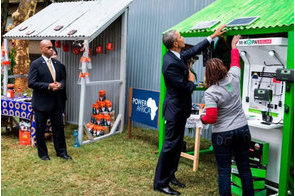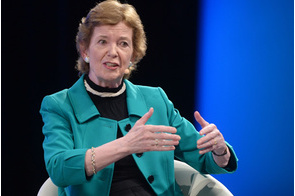Gates Foundation commits $1.4 billion to climate adaptation at COP27

Summary
The $1.4 billion will, amongst other investments, support the Africa Adaptation Initiative (AAI) to quickly build a pipeline of climate-smart agriculture projects across 23 countries in Africa.
The Bill & Melinda Gates Foundation, today, pledged to invest $1.4 billion to help smallholder farmers address the immediate and long-term impacts of climate change. The announcement was made by Gates Foundation CEO Mark Suzman at the United Nations Climate Change Conference (COP27) in response to African leaders’ calls for countries to rapidly scale-up finance for climate adaptation.
For many regions, climate change is a food and economic crisis without precedent, the foundation said in a statement sent to Financial Nigeria. According to the statement, more than 2 billion people depend on smallholder farms for food and income, yet less than 2% of global climate finance is devoted to helping these farms adapt to climate change. Food and economic crises will last longer and become more severe as climate threats escalate and further threaten food security by limiting smallholder farmers’ yields and resilience.
“The effects of climate change have already been devastating, and every moment the world delays action, more people suffer, and the solutions become more complex and costly,” said Suzman. “Our commitment will help smallholder farmers adapt today and build resilience for the future. It is essential for this climate summit to produce bold commitments that address immediate and long-term needs. Leaders must listen to the voices of African farmers and governments to understand their priorities and respond with urgency.”
The foundation’s commitment will fund immediate action and long-term initiatives over four years to help smallholder farmers in sub-Saharan Africa and South Asia build resilience and food security, according to the statement. The funding will focus on spurring African-led innovation to build a pipeline of climate-smart agriculture projects, new applications of digital technologies, climate-smart innovations for smallholder livestock farming, and support for women smallholder farmers to capitalize on their untapped potential.
To improve the livelihoods of rural women in sub-Saharan Africa and South Asia, the foundation is deepening its ongoing partnership with the International Fund for Agricultural Development (IFAD). The goal is to scale up initiatives that empower women farmers, support innovations at the nexus of gender and climate adaptation, and increase climate finance that gives rural women better access to the climate-smart resources they need to strengthen food systems.
To accelerate the development of new adaptation innovations, the foundation said it is continuing to work with a coalition of partners to double the budget for the CGIAR agriculture research system. The CGIAR Excellence in Agronomy initiative partners with African research institutes, local businesses, and farmer organizations. Together, they are using big data, analytics, and digital platforms to deliver insights that can boost incomes, food security, and ecosystem health in smallholder farming communities.
“The climate crisis is causing enormous harm every day as it jeopardizes entire regions of people and economies,” said Bill Gates, co-chair of the Bill & Melinda Gates Foundation. “More funding is necessary to ensure agricultural and technological innovations are widely available to vulnerable communities, helping them to adapt to climate change, save lives and increase economic growth.”
Additional investments included in the commitment announced today will support the Africa Adaptation Initiative (AAI) to quickly build a pipeline of climate-smart agriculture projects across 23 countries in Africa. Funding will provide targeted support for the technical capacity, planning, and project development required to implement programs.
Also included is the development of new applications of digital technologies to ensure smallholder farmers can anticipate and respond to climate threats. This includes an innovative weather intelligence platform developed through a new partnership between the Kenya Agricultural and Livestock Research Organization (KALRO) and TomorrowNow, which provides climate-smart agriculture strategies to farmers in East Africa via text messages.
The third area of the investments is African-led innovations to develop climate-smart options for improving livestock health and productivity while also reducing their climate footprint. This will be done in partnership with Canada’s International Development Research Centre (IDRC).
This funding builds on more than a decade of investments and the foundation’s recent announcement during the United Nations General Assembly of $100 million in funding to help alleviate the current food crisis in Africa and South Asia and address its underlying causes. It also builds on funding commitments focused on agriculture adaptation made at previous climate summits.
In 2021 at COP26, Bill & Melinda Gates Foundation Pledged $315 million to support innovations that help smallholder farmers adapt to climate threats. The foundation, in 2017, at One Planet Summit, pledged commitments of $300 million to help farmers in Africa and Asia cope with climate change.
Related
-
Power Africa launches new initiatives at COP21 in Paris
Scaling up access to cleaner electricity helps mitigate climate change and enhances resilience to climate shocks.
-
Avoiding a climate lockdown
Global warming will cause drinking water to degrade and enable pollution-linked respiratory diseases to thrive.
-
Interview: Mary Robinson
Climate change isn’t gender-neutral; women bear the brunt of its effects.










